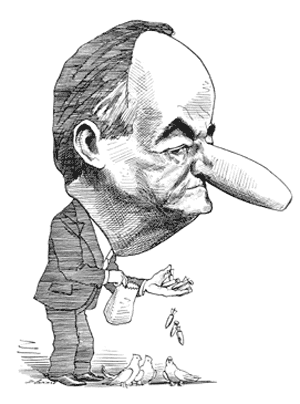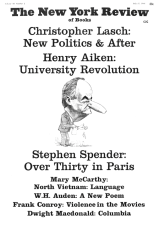To the Editors:
One evil consequence of Senator Kennedy’s dismaying death is the fear of the black poor that all their champions are to be assassinated. Another is the desertion by his own forces of the cause of peace that brought Robert Kennedy into the campaign. In refusing to endorse Senator McCarthy, they seem willing to cede both nomination and election to supporters of the war in Vietnam.
The nation needs a new order, a new politics, to which old-style machine candidates can bring nothing. Richard Nixon, it is true, has come forward with the sole exciting idea of the whole campaign—an unholy and very sensible alliance of black militants and white conservatives—but the blacks might recall that his reputation for expedient deceit is only matched by that of Lyndon Johnson. What could be expected of Richard Nixon but a lot more of the old order? Of Rockefeller—but mercifully—a little less? And machine Democrats do not intend to offer a true alternative.
Last year in Vietnam, decked out in GI war bonnet and sport shirt, Hubert Humphrey danced weird jigs of glee for the photographers; in an adjoining photo, according to the captain in The New York Times, a peasant woman pleaded with her American saviors to spare her hut. This year, incredibly, this low-priced man has tagged himself “soul brother.” Humphrey’s “politics of happiness” slogan is in a class with Nixon’s “feel safer with Nixon”—a crude, cynical appeal to all that is most cowardly and immature in the electorate.
What does it say about the Kennedy crusade, if it abandons the nation to these war candidates without a fight? Because the passivity is no longer grief but policy, Robert Kennedy’s lieutenants may wish to become Edward Kennedy lieutenants, and, anyway, they do not like McCarthy. They believe that Robert Kennedy was the President for the Future (will Edward Kennedy suit their purposes as well?), and possibly he was. He was not the Public’s fool, like Hubert Humphrey, and he knew the way the world was going, perhaps better than McCarthy. If he was by instinct a reactionary, that instinct had been modified. He learned to laugh at himself—the surest evidence that he was growing—and he could be candid: he acknowledged that the young people who supported Eugene McCarthy were more intelligent, more radical, more committed than those who supported Robert Kennedy. No doubt he knew, too, that this was because McCarthy emerged as a statesman, not a politician, in response to conscience rather than ambition, and so far, at least, has none of that old smell of con about him that in recent years has turned the nation’s stomach.
The reasons that make McCarthy the most honorable candidate may also insure his loss, but his good showing is important; he must be encouraged to carry his campaign into November, as a third-party candidate, if necessary. McCarthy is a quiet revolutionary by comparison to Malcolm or Che Guevara, but his revolt was genuine and its aftermath astonishing; it is possible, at least—if Congress reflects the evolved electorate that would put this cranky person into office—that he would move in the bold and unpolitic directions that will be required in our damaged world environment. He has not pursued the blacks, brandishing promises, and yet black militants (for this very reason, one suspects) were turning toward him even before Los Angeles. He was the first anti-war candidate and now he is the last, and an end to the war and its lunatic waste will do more for the poor and the sick cities than all other measures put together.
But the war’s end is as far away as ever. Knowing this, how can Kennedy’s people remain silent, especially when Senator Kennedy himself spoke of the common cause with Senator McCarthy in his final speech. To let that cause die out of spite or disappointment is so mean a tribute to the memory of Robert Kennedy that one must wonder if all those shiny followers were really anti-War or just pro-Camelot.
Peter Matthiessen
Sagaponack, Long Island
This Issue
July 11, 1968




